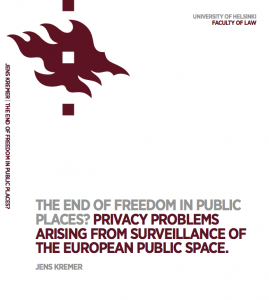On the 24th of March 2017, LOSS-Project Researcher Jens Kremer defended his dissertation ‘The End of Freedom in Public Places? Privacy problems arising from the surveillance of the European public space.’ Professor Iain Cameron from Uppsala University, served as the opponent. The dissertation is published with Unigrafia and can be accessed here.
Abstract:
This dissertation analyses specific privacy problems arising from the surveillance of public spaces. It studies the scope and limitations of the human right to privacy and a right to personal data protection in light of advanced surveillance and security technologies. The main research question therefore asks how the existing European fundamental rights to privacy and data protection address increasing surveillance and the unprecedented surveillance capabilities of public spaces in Europe.
This study is divided into two main parts. After introducing the research problem and a descriptive discussion of existing and future surveillance technologies, the first part discusses the theoretical conceptions behind this research, namely the concept of public space, privacy, data protection and security. Part two of this study then discusses four more specific issues in relation to public space surveillance: Individually targeted surveillance, mass surveillance, surveillance done by private actors, automation of surveillance, and incident prediction.
In order to address the research question, this study analyses existing legislation, jurisprudence and specific cases. The overall framework for analyses is derived from a fictional urban surveillance scenario, representing a large European city. This surveillance scenario serves as an anchor point to identify central problems and issues for further fundamental rights based analyses. In that sense, this study uses legal and critical analyses of a specific scenario in order to identify existing, but also potential future legal problems arising from sophisticated public space surveillance. This study consequently identifies several ways to address public space surveillance from a European fundamental rights perspective.
The analyses of a right to privacy and a right to personal data protection show that the European system of fundamental rights protection is very well capable of addressing legal problems arising from public surveillance. However, there is a lack of available case law dealing with complex technological surveillance in Europe. This study therefore distils two main approaches for addressing public surveillance: The first approach is based on individual freedom, relying on the legitimate expectations of legal subjects, the second, which is derived from human dignity and personality rights, challenges the communal effects of surveillance. Each approach comes with a fundamentally opposite take on public surveillance.
Furthermore, this study shows, how data protection functions as a gap-filler between the two approaches. In its conclusion, this study therefore illustrates several ways to address public space surveillance, and it shows that there is a series of legal problems arising from sophisticated technological surveillance, which require a reformulation of legal arguments addressing public place surveillance.
